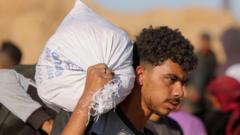The reduction of US funding for HIV programs is causing alarm in South Africa, where thousands reliant on antiretroviral treatments face uncertainty. Experts warn of a potential spike in infections as local clinics close, severely affecting vulnerable populations.
Cuts to US HIV Funding Threaten Lives in South Africa

Cuts to US HIV Funding Threaten Lives in South Africa
As the effects of US aid cuts unfold, South Africans living with HIV fear a resurgence in infections and a loss of crucial medical support.
Gugu once depended on a USAID-funded clinic in Johannesburg for her life-saving medication to manage her HIV status. With substantial cuts to aid from the United States, she and countless others now face significant challenges in their treatment journey. Despite being notified ahead about her clinic’s closure, Gugu received only fleeting relief; her nine-month bulk prescription will soon run out, pushing her towards a public hospital - a daunting alternative burdened by long wait times and potential stigma.
"I've seen many sex workers unwilling to seek help from government hospitals due to the long waits," she shared, highlighting the urgency of the situation. Gugu, whose advocacy work aids vulnerable sex workers, fears that the cuts could discourage many from accessing the treatment needed to prevent the transmission of HIV to their children.
The impact of funding cuts extends beyond individual treatment; a recent UNAids report warns that reversing the strides made against HIV/AIDS could lead to a sharp increase in new infections globally, threatening lives and progress established since the early 2000s. Africa has been a significant player in this fight, achieving promising declines in new infections and related deaths, mostly due to robust international aid efforts like the President's Emergency Plan for AIDS Relief (PEPFAR) initiated during George W. Bush's presidency.
Amidst these challenges, South Africa remains home to the highest number of people living with HIV. Approximately 7.7 million individuals are affected, with over 5.9 million receiving antiretroviral therapy which has notably reduced Aids-related deaths by 66% since 2010. Experts predict a troubling reversal of this progress if financial support continues to dwindle.
Prof. Lynn Morris from Wits University cautions that looming infection increases will not merely halt progress but may place additional burdens on health systems already stretched thin. As treatment infrastructure in the region falters, worries grow about the long-term implications for HIV vaccine research and the emergence of other infectious diseases.
Recent attempts at securing alternative research funding have brought some immediate relief, with groups like the Bill and Melinda Gates Foundation donating towards ongoing studies. However, the gap left by US cuts remains large, and researchers warn that it could set back valuable studies by months or even years.
Gugu’s fears extend beyond her own future. Being a caretaker for a young boy, she reflects on how these cuts could impact upcoming generations, calling into question the ongoing commitment to ensuring equitable health solutions for vulnerable communities. As South Africa grapples with these challenges, the fight against HIV/AIDS remains a critical public health priority, one that will require continued advocacy and support from both local and international bodies.


















